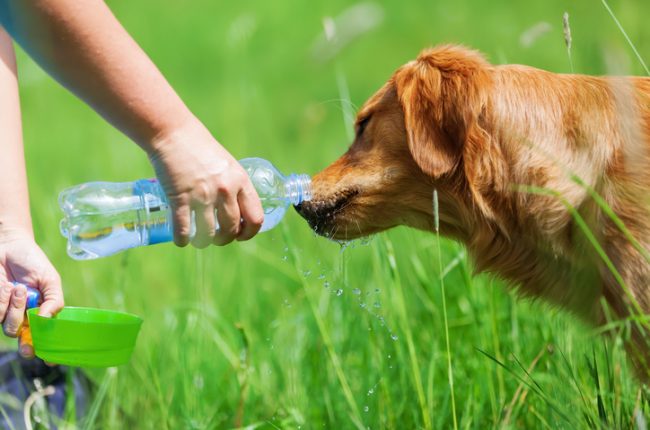Hot summer weather makes us more aware of the need to keep ourselves and our kids hydrated, but our furry companions are often overlooked. Dehydration is a serious risk to your pet’s health and can result in organ damage or even death. Since our pets can’t talk to us (as much as we wish they could and may pretend they do) the only thing we can do is be aware of the signs of dehydration and do our best to prevent it.
Signs of dehydration in dogs & cats
- Sunken eyes
- Lethargy
- Vomiting or diarrhea
- Loss of appetite
- Loss of skin elasticity
Cats
Dehydration in cats is most commonly a sign of a more significant health problem like kidney, heart or liver problems. Since they do not typically go for walks, hikes, play fetch and whatnot, they are not usually at risk for heat stroke. Yet, if your cat gets trapped in a part of your home or car that is not temperature controlled this can be deadly.
If you notice your cat is more lazy than usual (I mean, we are talking about cats here), you may want to try putting him or her in a cool, dark room with fresh water at their disposal. This can reduce their stress level and encourage them to rehydrate themselves based on their instinctive needs.
If your cat has been refusing to eat or vomiting frequently, has skin “tenting,” or their gums are dry and tacky, you should take action immediately. Call your veterinarian to discuss the symptoms and decide if you should seek emergency care.
Dogs
While dehydration in dogs, like cats, can be a sign of acute illness, they are also prone to overexertion and heatstroke in the hot summer months. More active dogs run a higher risk, as long walks, hikes, or hours playing outside can lead to overheating and a loss of electrolytes just like in humans.
Be sure to avoid walks during peak sun hours, instead try early morning or early evening when the sun is less intense, and if you’re outdoors for a long time just make sure to have water with you. They make collapsable bowls, which are easy for travel, or hydration back packs so your dog can carry their own water.
And while you can give your dog pediatric electrolyte fluids in a pinch, there are great rehydration electrolyte “doggie drinks” available now which are formulated to a dog’s particular physical needs.
You need to be proactive, though. Many dogs will not signal if they are overheating or becoming dehydrated while out doing something ridiculously fun like racing through the dog park or hiking the local trail, so be prepared and do your best to prevent dehydration before it happens.
Of course, if you notice any signs like excessive panting, vomiting or lethargy be sure to contact your veterinarian and get an expert opinion to assess your dog’s health.
Dehydration Prevention Checklist
- Access to clean water at all times
- Check water bowl frequently
- Wash water bowl daily
- Monitor your pet’s time outside (do not take walks during peak heat times)
- Provide adequate relief from heat and sun
- Do not EVER leave your pet in your car




